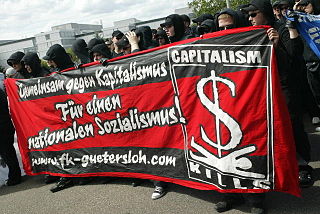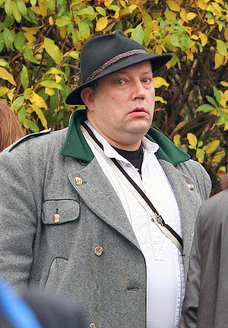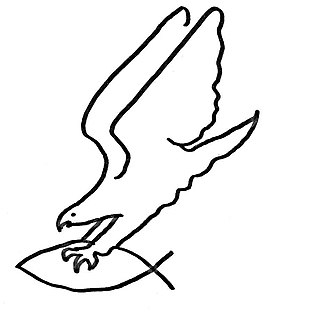
The Homeland, previously known as the National Democratic Party of Germany, is a far-right Neo-Nazi and ultranationalist political party in Germany.

Holger Apfel is a German politician who was the leader of the far-right National Democratic Party of Germany (NPD) from 2011 to 2013. He was a member of the Saxon Parliament between 2004 and 2014, serving as the chairman of the NPD parliamentary group and a member of the presidium of the parliament.

Christian Worch is a prominent German neo-Nazi activist and chairman of the far-right political party Die Rechte.
Exit is the name of a Swedish and a German anti-Nazi organisation, as well as another Swedish organisation with broader goals. The German anti-Nazi organisation was modelled on the Swedish one. All three groups aim to provide support and rehabilitation for neo-Nazis wanting to leave that subculture, as well as support for parents and those whose work brings them into contact with people involved in Nazism.
The Nationalist Front was a minor German neo-Nazi group active during the 1980s.
Since its emergence in the 1970s, Neopaganism in German-speaking Europe has diversified into a wide array of traditions, particularly during the New Age boom of the 1980s.

The far-right in Germany slowly reorganised itself after the fall of Nazi Germany and the dissolution of the Nazi Party in 1945. Denazification was carried out in Germany from 1945 to 1949 by the Allied forces of World War II, with an attempt of eliminating Nazism from the country. However, various far-right parties emerged in the post-war period, with varying success. Most parties only lasted a few years before either dissolving or being banned, and explicitly far-right parties have never gained seats in the Bundestag post-WWII.

Autonome Nationalisten are German, British, Dutch, and to a lesser degree Flemish, nationalists, who have adopted some of the far-left and antifa's organizational concepts, demonstration tactics, symbolism, and elements of clothing, including Che Guevara T-shirts and keffiyehs. Similar groups have also appeared in some central and eastern European countries, beginning with Poland, the Czech Republic, Ukraine, Romania and Greece and others.
Anton Maegerle is the Pseudonym of the German journalist Gernot Modery. He is also the author of books about far-right politics, right-wing radicalism, the New Right, and right-wing policy in general.
Heike Langguth is a German two times vice-champion in Muay Thai.

The National Socialist Underground, or NSU, was a German neo-Nazi militant organization active between 2001 and 2010, and uncovered in November 2011. Regarded as a terror cell, the NSU is mostly associated with Uwe Mundlos, Uwe Böhnhardt and Beate Zschäpe, who lived together under false identities. Between 100 and 150 further associates were identified who supported the core trio in their decade-long underground life and provided them with money, false identities and weapons. Unlike other terror groups, the NSU had not claimed responsibility for their actions. The group's existence was discovered only after the deaths of Böhnhardt and Mundlos, and the subsequent arrest of Zschäpe.

Gottfried Küssel is an Austrian far-right political activist who also gained some notoriety in Germany. He has been a leading figure in neo-Nazism and Holocaust denial since the 1970s.
Ursula Hedwig Meta Haverbeck-Wetzel is a German right-wing extremist activist from Vlotho. Since 2004, she has been the subject of lawsuits and convicted due to her Holocaust denial, which in Germany is a criminal offense.
The Wunsiedel decision is an order issued by the First Senate of the Federal Constitutional Court of Germany on 4 November 2009.
The Collegium Humanum was an ecofascist organisation in Germany from 1963 to 2008. It was established in 1963 as a club, was first active in the German environmental movement, then from the early 1980s became a far-right political organisation and was banned in 2008 by the Federal Minister of the Interior Wolfgang Schäuble due to "continued denial of the Holocaust".

The III. Path or The Third Path is a far-right and neo-Nazi political party in Germany.
Besseres Hannover was a right-wing extremist group from Lower Saxony. The group was banned in September 2012 by Lower Saxony's Interior Minister Uwe Schünemann. The ban became incontestable by order of the Federal Administrative Court of 6 January 2014. It also became known nationwide through the "Abschiebär", a character who appeared in propaganda videos and at various events in Germany.
Gruppe S, named after founder Werner S., was an alleged far-right terrorist group in Germany that emerged on the internet in September 2019 and was dismantled in February 2020 with the arrest of several militants. They are said to have armed themselves in a few months, conducted target practice and planned simultaneous assassinations of Muslims in mosques, prominent politicians and people close to anti-fascist movements.

Eagle catching fish or eagle catching ichthys is a German anti-Christian and neo-pagan symbol.









